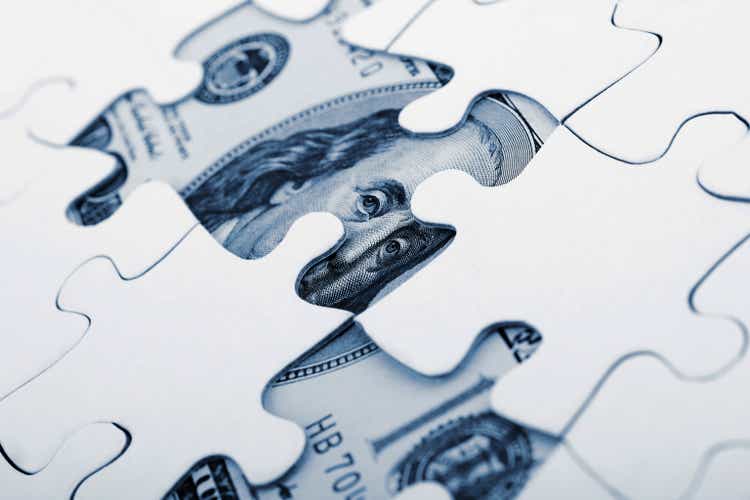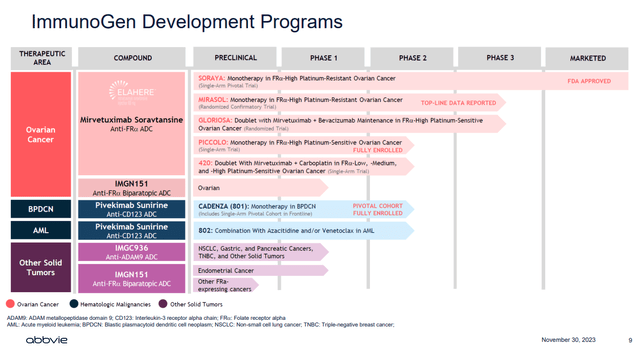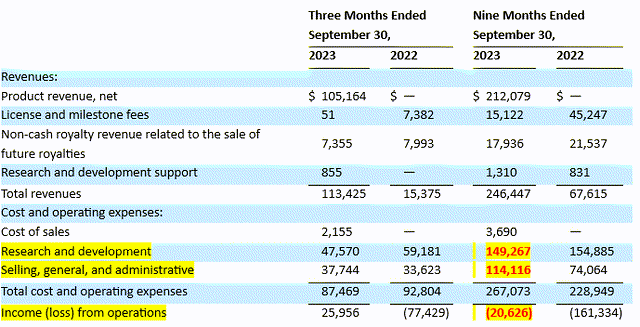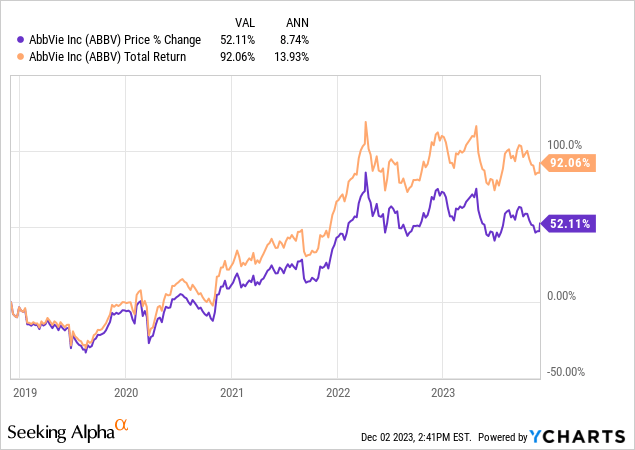Summary:
- AbbVie has agreed to acquire ImmunoGen for $10 billion, nearly double its previous trading price.
- The acquisition provides AbbVie with a commercial-stage company and a flagship drug that generated $105 million in sales in Q3.
- Let’s look at this massive acquisition’s “behind the curtain” benefits.

Aslan Alphan/iStock via Getty Images
Do you wonder why companies are willing to pay what appears to be a hefty premium for other companies? If so, take a look at the four points below.
What happened?
In the biggest blockbuster acquisition since acquiring Allergen for over $60 billion in 2019, AbbVie (NYSE:ABBV) has agreed to acquire ImmunoGen (IMGN) for $10 billion.
The move surprised many and, of course, led to a few adverse knee-jerk reactions. After all, the price is nearly double what ImmunoGen traded for the day before. AbbVie’s share price dipped, then recovered higher as the experts digested the move.
The move is brilliantly timed. AbbVie is replacing its Humira sales (more on that here and here) with Skyrizi and Rinvoq, continuing to develop its aesthetics program with Juvederm and Botox, and seeing solid traction with Botox for migraines. But the oncology segment is scuffling, and we all know the dangers of overreliance on a few products.
It is also fantastic timing because the ImmunoGen signature drug is starting a significant ramp-up.
Let’s look at four reasons why there is more to the acquisition than meets the eye.
The 4 Hidden Values of the Acquisition.
1. The benefits of buying a commercial-stage company.
ImmunoGen’s flagship drug
The headline of the ImmunoGen portfolio is the drug ELAHERE. The drug is an antibody-drug conjugate (ADC) that treats ovarian and other cancers. It was granted accelerated approval in 2022.
This drug alone produced $105 million in sales for ImmunoGen in Q3 – a $420 million annual run rate. Put the weight of AbbVie’s infrastructure behind it, plus expanding approvals and designations, and the drug looks like a serious winner.
ImmunoGen also has a pipeline with other drugs in Stage 3, as shown below.

Source: AbbVie
The hidden value in purchasing a commercial-stage company with a marketable product comes from savings on research and development (R&D). Pharmaceutical companies spend billions developing products that often never make a dollar. AbbVie spent $6.5 billion on R&D in 2022 and $5.7 billion through Q3 this year.
Often, purchasing a ready-made product, even for a premium, is a terrific financial move.
2. Hidden tax assets
This is an area where I can provide insight as a CPA. When a company loses money (called net operating loss carryforwards or “NOLs”), it carries those losses forward indefinitely to offset future income and save money on taxes. We call this a deferred tax asset. Generally, these assets are transferred to the acquirer – AbbVie will use them to offset future income taxes. This is real money.
ImmunoGen has been losing money for years as a developmental stage company and has vast NOL carryforwards.
But wait! There aren’t any deferred tax assets on ImmunoGen’s balance sheet. This is due to accounting rules that say you must discount the assets if they aren’t likely to be realized.
Here’s an easy way to understand it. Say you are a business with a receivable from a company for $1 million. But that company is on the verge of bankruptcy and unlikely to pay you. You must write down that $1 million receivable on your balance sheet. It still exists, and you may someday collect, but it shows as a net zero on the public-facing balance sheet. ImmunoGen has written down its tax assets in the same way.
Here is the language from the notes to their financial statements:
The realization of deferred income tax assets is dependent on the generation of sufficient taxable income during future periods…Where the realization of such assets does not meet the more likely than not criterion, the Company applies a valuation allowance against the deferred income tax asset under consideration. As of September 30, 2023, the Company has a full valuation allowance applied against its deferred tax assets.
In plain English: “We have these assets, but they are written down to zero.”
As of December 31, 2022, ImmunoGen reported on its 10-K $443 million in federal NOL carryforwards and net deferred tax assets of $334 million before the valuation allowance.
It remains to be seen exactly how much of these assets will transfer. But AbbVie will likely benefit to the tune of hundreds of millions in future tax savings from the acquisition.
3. Net asset value.
ImmunoGen has $767 million in current assets, including $736 million in cash and receivables. It only reports $135 million in current liabilities and $261 million in total liabilities.
The acquisition comes with over $500 million in net current assets over total liabilities, or 5% of the total purchase price. And even that is slightly understated.
ImmunoGen has a measly $4.4 million in property and equipment reported on the balance sheet. Big deal, right?
Property and equipment are reported net of depreciation. ImmunoGen depreciates its property in 3-7 years, as shown below.

Source: ImmunoGen 10-K
So, most of its equipment is written down to nothing, but this equipment isn’t worthless.
Here is another example: Say you own a rental home. You depreciate it every year on your taxes until its basis is written down to zero. That rental property is probably worth much more on the open market than you paid for it initially, plus it generates income. But your tax balance sheet lists it with zero net value. The same is true for companies.
ImmunoGen has property, machinery, and equipment with an original cost of $36 million. It’s not a massive coup, but it still adds value to the company that isn’t obvious at first glance. AbbVie can use the property and equipment or sell it and pocket the cash.
4. Cost synergies
Some have panned the acquisition since ImmunoGen isn’t profitable. Again, this requires deeper thought. Let’s take a look at how the professionals look at it.
ImmunoGen lost $21 million from operation through Q3 2023, as depicted below.

ImmunoGen 10-Q
The company spent a whopping $114 million on selling, general, and administrative costs (SG&A). Much of this will decline or be eliminated as AbbVie’s existing structures absorb it.
ImmunoGen currently pays for its own auditors, accounting department, sales force, insurance, human resources, and tons of other overhead costs. These will be integrated into AbbVie’s existing systems, leading to tremendous savings.
The acquisition will create operational efficiencies that quickly turn that operating loss into income.
Speaking of operating losses, ImmunoGen spent nearly $150 million this year on R&D. This shows that ImmunoGen’s existing products are extremely profitable. The company is just using the money it makes to invest in its pipeline and support its overhead.
Is AbbVie stock a buy now?
AbbVie stock continues to chug along, providing us with a solid, growing dividend and a current yield of over 4.3%. The stock isn’t going to make us rich overnight like some risky, high-growth tech stocks, but it isn’t going to make us poor, either.
Those pointing to “more painful downside” obviously have a different timeline than I do. AbbVie has returned 14% annually over the past five years and 92% overall.

The Humira cliff caused some handwringing, but AbbVie’s management is well-prepared, and this ImmunoGen acquisition is excellently timed with tremendous potential to pay off handsomely.
AbbVie is a recession-resistant income stock that has anchored my portfolio for years and will continue to do so until the story changes.
Analyst’s Disclosure: I/we have a beneficial long position in the shares of ABBV either through stock ownership, options, or other derivatives. I wrote this article myself, and it expresses my own opinions. I am not receiving compensation for it (other than from Seeking Alpha). I have no business relationship with any company whose stock is mentioned in this article.
Investors' goals, financial situations, timelines, and risk tolerances vary widely. The stocks mentioned may not be suitable for all. As such, the article is not meant to suggest action on the reader's part. Each investor should consider their unique situation and perform their own due diligence.
The author is short the following option: ABBV MAR 2024 $160 CALL
Seeking Alpha’s Disclosure: Past performance is no guarantee of future results. No recommendation or advice is being given as to whether any investment is suitable for a particular investor. Any views or opinions expressed above may not reflect those of Seeking Alpha as a whole. Seeking Alpha is not a licensed securities dealer, broker or US investment adviser or investment bank. Our analysts are third party authors that include both professional investors and individual investors who may not be licensed or certified by any institute or regulatory body.
